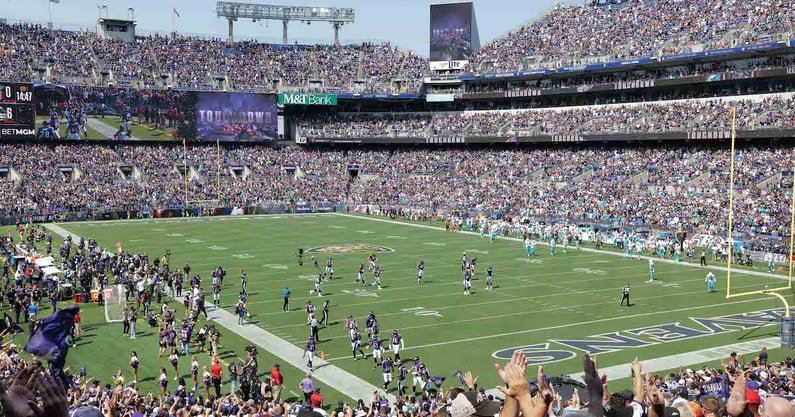Pennsylvania man facing multiple felonies after flying drone over AFC Championship game

A Pennsylvania man is facing some serious criminal charges after flying a drone over M&T Bank Stadium in Baltimore during the AFC Championship game between the Ravens and Kansas City Chiefs, federal prosecutor’s announced on Monday. The game was briefly paused in the first half while the drone was over the stadium.
Matthew Hebert has been charged with a number of federal felonies for illegal flying his drone over the stadium on Jan. 28, per a release from the U.S. Attorney’s Office representing the District of Maryland. Because the governance of U.S. airspace falls to the Federal Aviation Administration, crimes involving aerial vehicles such as drones — referred to as Unmanned Aerial Systems (UAS) — are risible to the federal level.
Hebert is also under scrutiny for operating his drone with proper certification. If convicted on these charges, he is facing up to four years in prison.
“Illegally operating drones poses a significant security risk that will lead to federal charges,” U.S. attorney Erek Barron said in the release. “Temporary flight restrictions are always in place during large sporting events.”
On the Sunday of the AFC Championship game, a temporary flight restriction (TFR) was placed around M&T Bank Stadium, as is common around many large sporting events around the country. They begin an hour before the event is scheduled to begin and usually end an hour after it has concluded. It creates a radius of three nautical miles around the stadium that aircraft are not supposed to enter.
Top 10
- 1Trending
Louisiana Governor
Fires shot at LSU AD
- 2Hot
Nick Saban
Roster spend determines best job
- 3New
Arch Manning
Texas updates status vs. Vandy
- 4
Coach O
Pitches himself for SEC job
- 5
Cam Coleman injury
Auburn reveals status vs.Cats
Get the Daily On3 Newsletter in your inbox every morning
By clicking "Subscribe to Newsletter", I agree to On3's Privacy Notice, Terms, and use of my personal information described therein.
Hebert’s drone flew over the stadium in the first half and was deemed a big enough security risk to cause an administrative timeout. State and federal law enforcement then followed the drone to where it landed, at which point they found Hebert, who spoke to authorities.
According to the release, Hebert was up front about what he had done. He was unaware that he was not allowed to fly his drone over the stadium, apparently.
Hebert advised law enforcement that he purchased a DJI UAS in 2021 and used the DJI account to operate the drone. The drone was not registered, nor did Hebert possess a Remote Pilot certificate to operate it. As detailed in the affidavit, on past occasions, the DJI application prevented him from operating the UAS due to flight restrictions and Hebert relied exclusively on the DJI application to tell him if he was not allowed to fly the UAS. The affidavit alleges that on January 28, 2024, Hebert assumed he was allowed to fly his UAS since the DJI application did not prevent him from doing so. Hebert allegedly flew the drone approximately 100 meters or higher for approximately two minutes. According to the affidavit, while in flight, Hebert captured approximately six photos of himself and the Stadium and may have taken a video as well.
“Operating a drone requires users to act responsibly and educate themselves on when and how to use them safely,” acting special agent in charge R. Joseph Rothrock of the FBI’s Baltimore field office said. “The FBI would like to remind the public of the potential dangers of operating a drone in violation of federal laws and regulations. The reckless operation of a UAS in the vicinity of a large crowd can be dangerous to the public, as well as interfere with other law enforcement and security operations.”